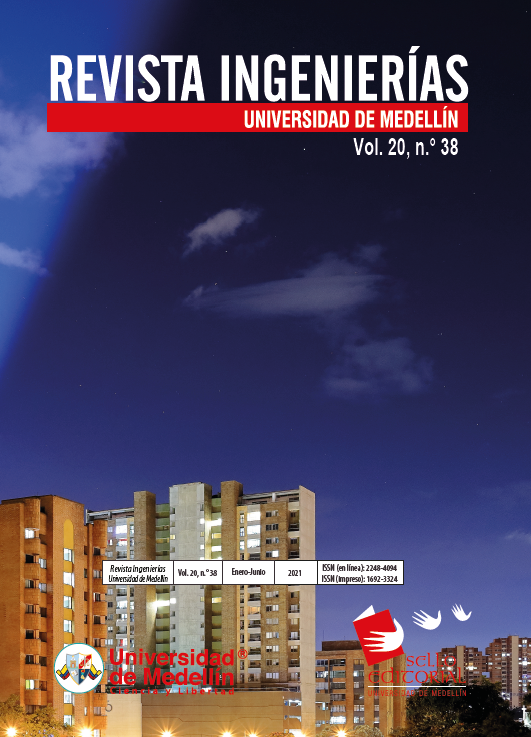Sistemas de recomendación en educación: una reseña de los mecanismos de recomendación en entornos de aprendizaje virtual (E-learning)
Contenido principal del artículo
Resumen
Recientemente, han emergido nuevas tendencias y metodologías que han favorecido enormemente al sector educativo. El e-learning como alternativa a los procesos de enseñanza y aprendizaje regulares ha transformado las dinámicas educativas debido a la inclusión de los MOOC, entornos personales de aprendizaje, permitiendo que el proceso educativo sea llevado a cabo en un nivel personalizado en donde el foco esté puesto en los estilos de aprendizaje y el perfil del estudiante. Este artículo presenta una revisión de trabajos actuales alrededor de mecanismos de aprendizaje de máquina para hacer recomendaciones en el entorno educativo, en donde se encuentra que, aparte del descubrimiento del estilo de aprendizaje del estudiante, es importante conocer su nivel de conocimiento y su velocidad de aprendizaje, así como las herramientas usadas por el estudiante para llevar a cabo sus estudios. Finalmente, se hace énfasis en la oportunidad de implementar y seguir investigando estas cuestiones en Colombia.
Detalles del artículo
Citas
M. S. Ramírez-Montoya and F. J. García-Peñalvo, 'Presentación. La integración efectiva del dispositivo móvil en la educación y en el aprendizaje,' RIED. Rev. Iberoam. Educ. a Distancia, vol. 20, 2, p. 29, 2017. DOI: http://dx.doi.org/10.6018/red/52/1
R. Avello Martínez and J. M. Duart, 'Nuevas tendencias de aprendizaje colaborativo en e-learning: Claves para su implementación efectiva,' Estud. pedagógicos, vol. 42, 1, pp. 271–282, 2016. DOI: http://dx.doi.org/10.4067/S0718-07052016000100017
K. Schwab, 'El surgimiento de nuevas tecnologías - Archivo Digital de Noticias de Colombia y el Mundo desde 1.990 - eltiempo.com,' 2016. [Online]. Available: https://www.eltiempo.com/archivo/documento/CMS-16759801. [Accessed: 22-Feb-2019].
Y. Ramírez León, 'Presentación de contenidos en entornos educativos virtuales basada en la adaptación a los estilos de aprendizaje,' Etic@Net, vol. 11, 1695–324X, pp. 306–321, 2011.
M. I. Jordan and T. M. Mitchell, 'Machine learning: Trends, perspectives, and prospects.,' Science, vol. 349, 6245, pp. 255–60, 2015. DOI: 10.1126/science.aaa8415
V. Sanchez-anguix, R. Chalumuri, and V. Julian, 'A multi-objective evolutionary proposal for matching students to supervisors,' vol. 800, pp. 94–102, 2019. DOI: https://doi.org/10.1007/978-3-319-94649-8_12
S. K. Howard, J. Ma, and J. Yang, 'Student rules: Exploring patterns of students’ computerefficacy and engagement with digital technologies in learning,' Comput. Educ., vol. 101, pp. 29–42, 2016. DOI: 10.1016/j.compedu.2016.05.008
C. K. Pereira, F. Campos, V. Ströele, J. M. N. David, and R. Braga, 'BROAD-RSI – educationalrecommendersystemusing social networksinteractions and linked data,' J. Internet Serv. Appl., vol. 9, 1, 2018. DOI: https://doi.org/10.1186/s13174-018-0076-5
M. Birjali, A. Beni-Hssane, and M. Erritali, 'A novel adaptive e-learning model based on Big Data by using competence-based knowledge and social learner activities,' Appl. SoftComput. J., vol. 69, pp. 14–32, 2018. DOI: 10.1016/j.asoc.2018.04.030
M. Tahmasebi, F. FotouhiGhazvini, and M. Esmaeili, 'Implementation and Evaluation of a Resource-Based Learning Recommender Based on Learning Style and Web Page Features,' J. Web Eng., vol. 17, 4, pp. 284–304, 2018.
V. Bradac and B. Walek, 'A comprehensive adaptive system for e-learning of foreign languages,' ExpertSyst. Appl., vol. 90, pp. 414–426, Dec. 2017. DOI: https://doi.org/10.1016/j.eswa.2017.08.019
P. K. Udupi, P. Malali, and H. Noronha, 'Big data integration for transition from e-learning to smart learning framework,' 2016 3rd MEC Int. Conf. Big Data Smart City, 2016.
N. D. H. Cuong, N. Arch-Int, and S. Arch-Int, 'FUSE: A Fuzzy-Semantic Framework for Personalizing Learning Recommendations,' Int. J. Inf. Technol. Decis. Mak., vol. 17, 04, pp. 1173–1201, 2018. DOI: https://doi.org/10.1142/S0219622018500220
K. Takaoka, K. Yamazaki, E. Sakurai, K. Yamashita, and Y. Motomura, 'Development of an integrated AI platform and an ecosystem for daily life, business and social problems,' Adv. Intell. Syst. Comput., vol. 787, pp. 300–309, 2019. DOI: https://doi.org/10.1007/978-3-319-94229-2_29
V. Kant, T. Jhalani, and P. Dwivedi, 'Enhanced multi-criteria recommender system based on fuzzy Bayesian approach,' Multimed. Tools Appl., vol. 77, no. 10, pp. 12935–12953, 2018. DOI: https://doi.org/10.1007/s11042-017-4924-2
M. B. Lopez, A. J. H. Montes, R. V. Ramirez, and G. A. Hernandez, 'EmoRemSys: Sistema de recomendación de recursos educativos basado en detección de emociones,' RISTI - Rev. Ibérica Sist. e Tecnol. Informação, 17, Mar. 2016. DOI: 10.17013/RISTI.17.80-95
B. D. Nye, 'Intelligent tutoring systems by and for the developing world: A review of trends and approaches for educational technology in a global context,' Int. J. Artif. Intell. Educ., vol. 25, 2, pp. 177–203, 2015. DOI: https://doi.org/10.1007/s40593-014-0028-6
A. Klašnja-Milićević, M. Ivanović, B. Vesin, and Z. Budimac, 'Enhancing e-learning systems with personalized recommendation based on collaborative tagging techniques,' Appl. Intell., vol. 48, 6, pp. 1519–1535, 2018. DOI: https://doi.org/10.1007/s10489-017-1051-8
E. R. Núñez-Valdez, D. Quintana, R. González Crespo, P. Isasi, and E. Herrera-Viedma, 'Arecommender system based on implicit feedback for selective dissemination of e-books,' Inf. Sci. (Ny)., vol. 467, pp. 87–98, 2018. DOI: https://doi.org/10.1016/j.ins.2018.07.068
L. X. Li, S. Soraya, and A. Rahman, 'Students’ learning style detection using tree augmented naïve Bayes Subject Category: Subject Areas :,' R. Soc. Open Sci., 2018. DOI: 10.1098/rsos.172108
M. W. Rodrigues, S. Isotani, and L. E. Zárate, 'Educational Data Mining: A review of evaluation process in the e-learning,' Telemat. Informatics, vol. 35, 6, pp. 1701–1717, 2018. DOI: 10.1016/j.tele.2018.04.015
S. KumarBasak, M. Wotto, and P. Bélanger, 'E-learning, M-learning and D-learning: Conceptual definition and comparative analysis,' E-Learning Digit. Media, vol. 15, 4, pp. 191–216, 2018. DOI: 10.1177/2042753018785180
S. Assami, N. Daoudi, and R. Ajhoun, 'Personalization criteria for enhancing learner engagement in MOOC platforms,' IEEE Glob. Eng. Educ. Conf. EDUCON, vol. 2018–April, pp. 1265–1272, 2018. DOI: 10.1109/EDUCON.2018.8363375
O. M. Spositto, M. E. Etcheverry, H. L. Ryckeboer, and J. Bossero, 'Aplicación de técnicas de minería de datos para la evaluación del rendimiento académico y la deserción estudiantil,' 2008.
J. Sujatha and S. P. Rajagopalan, 'Performance evaluation of machine learning algorithms in the classification of Parkinson disease using voice attributes,' Int. J. Appl. Eng. Res., vol. 12, 21, pp. 10669–10675, 2017.
A. E. S. Carvalho Brito et al., 15th European Concurrent Engineering Conference 2008, ECEC ’2008 [and] 5th Future Business Technology Conference, FUBUTEC ’2008 : April 9-11, 2008, Porto, Portugal. Eurosis-Eti, 2008.





